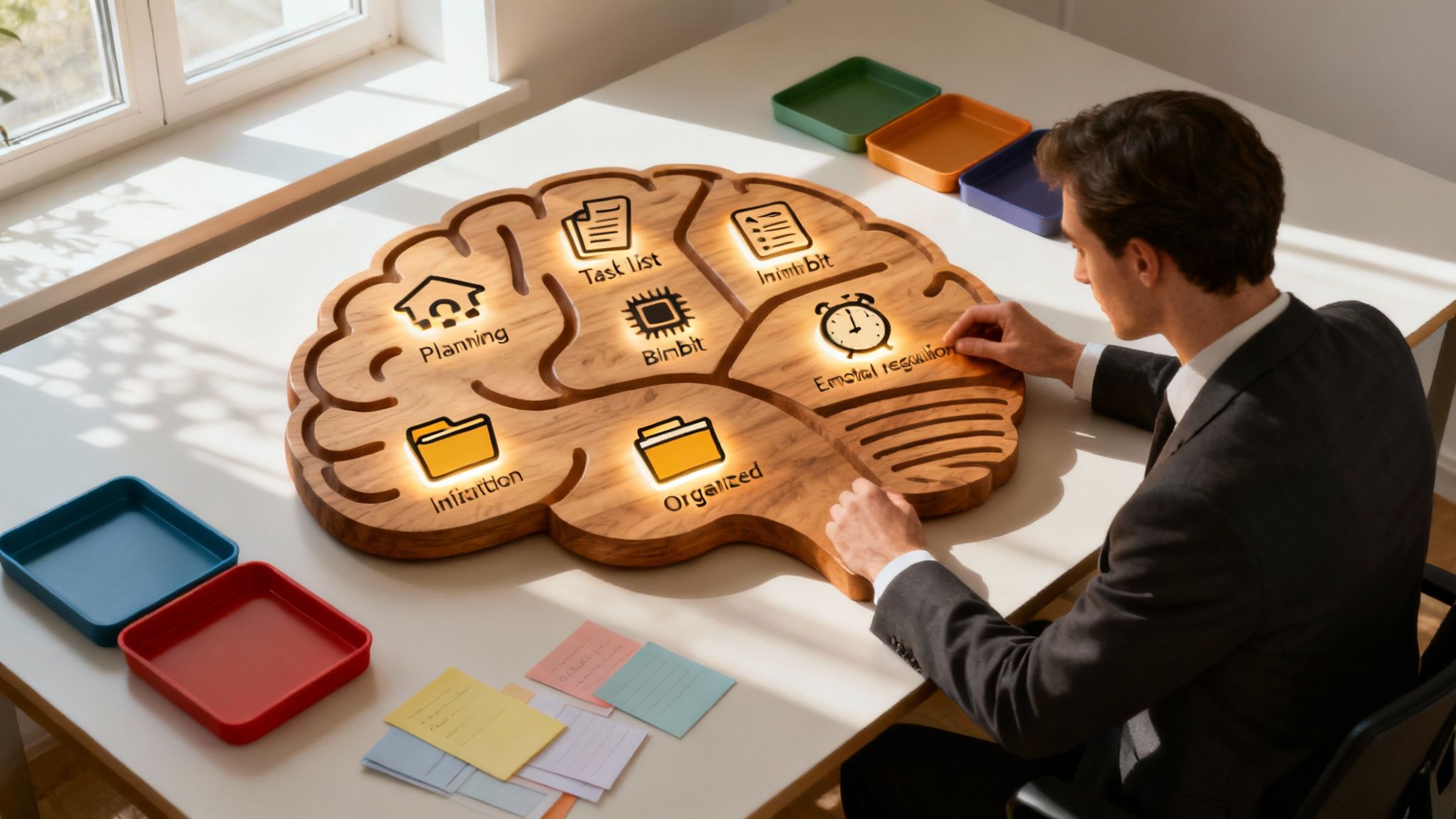Some people with ADHD and autism are labeled as 'gifted' during childhood, receiving praise for their exceptional abilities and high achievements within academic environments. (You may have heard the term "twice exceptional" or "2e" to describe neurodiversity and giftedness.)
But school doesn't last forever. When gifted children with ADHD transition into adulthood, they often face burnout.
As gifted ADHD individuals grow older, they may find that their strengths and abilities no longer align well with the demands of everyday life. The transition into adulthood introduces a new level of obligations and adulting responsibilities. This mismatch between their exceptional abilities and the high demands placed upon them can lead to increased pressure and stress.
Burnout can develop when individuals internalize the high expectations they have for themselves or the expectations imposed by others. The relentless pursuit of perfection can lead to self-blame, frustration, and heightened stress levels, ultimately impacting their mental well-being.
If you identify with this experience, you're not alone! This article will explore gifted kid burnout in ADHD adults, shed light on their unique challenges, and offer strategies to navigate this complex journey.
Too long; didn't read
- Gifted kid burnout or gifted kid burnout syndrome is experienced by adults labeled 'gifted' in their childhood. They do not necessarily have to have ADHD to experience it.
- Gifted kid burnout is most often caused by pressure from parents and educators, perfectionism, and heavy workloads.
- Common signs of gifted kid burnout in ADHD adults include overwhelm, executive functioning issues, and social isolation.
- Twice-exceptional (2e) is a term for people who are both gifted and neurodivergent.
What is gifted kid burnout?
Gifted kid burnout in ADHD adults refers to the phenomenon where people who were identified as "gifted" during childhood experience a state of physical, mental, and emotional exhaustion as an adult. While the term "gifted kid burnout" may not be about children, it does stem from childhood experiences.
Research shows that gifted kids are more stressed than their peers due to one or more of these factors:
- Pressure to succeed
- Perfectionism
- High sensitivity
- Difficulties with social interactions
- External pressures from teachers and parents
As a result, they're more likely to develop burnout that can last into adulthood, which causes symptoms like chronic fatigue, decreased motivation, and emotional dysregulation.
How to spot an ADHD adult dealing with gifted kid burnout
Gifted kid burnout in ADHD adults can be complex and deeply personal, and the way it feels can vary from person to person. However, here are some common feelings and experiences:
- Overwhelm — The constant pressure to perform at high levels and meet expectations can be overwhelming for gifted adults, stemming from internal (self) and external (others) sources.
- Exhaustion — Persistent physical and mental exhaustion is a primary symptom of burnout, leaving individuals feeling drained, low on energy, and struggling to find motivation.
- Feeling discouraged and frustrated — When ADHD adults with gifted kid burnout syndrome set big goals for themselves, they often struggle to follow through and meet them. Over time, this leads to feelings of inadequacy, self-doubt, and a sense of not reaching their full potential. This can eventually spiral into cynicism and reckless behavior.
- Loss of passion — Gifted kid burnout can diminish the enthusiasm someone once had for their areas of interest or expertise. Activities that used to bring joy and fulfillment may now feel like a burden or a source of stress. This is sometimes referred to apathy and anhedonia.
- Emotional instability — Burnout can cause dysregulated emotions, resulting in mood swings, irritability, rejection sensitivity, and a lower tolerance for stress and frustration.
- Executive dysfunction — Burnout can impair cognitive functioning skills, specifically those related to executive functions. This can manifest as forgetfulness, poor concentration, and indecisiveness.
- Isolation and loneliness — Gifted ADHD adults with burnout may withdraw socially, disconnecting from others who they feel do not relate to or understand them. This sense of isolation can contribute to loneliness and depression, worsening burnout symptoms.
“Once we have boundaries in place, we still have to maintain them. We can protect our boundaries by practicing vulnerability. Sharing when we’re struggling and how others can support us is an important step towards recovery.” - The Inflow app | Burnout module, day 4
Don't let gifted kid burnout hinder your quality of life. The Inflow app has individual coaching, a supportive community, and learning modules on topics like burnout, healthy boundaries, and overwhelm to provide you with the support and strategies you need. Take our ADHD quiz to get started.
What causes gifted kid burnout?
Pressure to perform
Gifted children often encounter well-meaning coaches, mentors, and parents who expect them to achieve remarkable accomplishments. The weight of these high standards becomes internalized, shaping the mindset of gifted ADHD adults.
Even when the external pressures fade away, they continue to drive themselves relentlessly, driven by their ingrained pursuit of excellence.
The quest for perfection
The perfectionist mindset often imposed on gifted kids creates an unending drive to push themselves. Believing that "just a little more effort will lead to perfection" sets them up for repeated disappointments and the inability to meet their standards. This cycle of perpetual striving without satisfaction causes exhaustion, frustration, and, ultimately, burnout.1
Great expectations
When expectations for your future are unrealistic or feel like they are smothering you, they can easily contribute to overwhelm and burnout.
Lack of challenge or engagement
Just as gifted kids may find school "too easy" and struggle to stay engaged, adults can face similar challenges—whether it's a job that offers limited opportunities for their talents to shine or mundane tasks that fail to stimulate their intellect and creativity. The lack of challenge or engagement can leave gifted individuals feeling bored and unfulfilled, increasing their risk of experiencing burnout.
Stress due to an intense workload
Gifted children may be enrolled in advanced classes, enrichment programs, or extracurricular activities, leading to a demanding and rigorous workload. Juggling multiple commitments without sufficient rest or downtime can contribute to burnout.
Twice-exceptional (2e) adults with ADHD
Twice-exceptional people are both intellectually gifted and neurodivergent.2
Burnout is heavy for anyone, but ADHDers experience burnout more often than neurotypical people because we tend to bite off more than we can chew. Add the pressures of masking and the high expectations placed on gifted people, and the stress can become overwhelming.
Many 2e adults with ADHD experience rejection sensitivity dysphoria (RSD). Trying to avoid potential rejection through people-pleasing, overcommitment, and perfectionism can be incredibly draining.
Because they have so many skills, it can be easy to forget that they also need rest and support, mainly because they likely won't seek them out. One study even found that many gifted college students declined ADHD accommodations to avoid being singled out.3
🎓 Want to know how to get the right support instead? Read our articles on achieving academic success with ADHD and ADHD college accommodations.
💼 If you're out of school, you may want to look at the pros and cons of disclosing ADHD at work and how to get workplace accommodations for ADHD.
Preventing and dealing with gifted kid burnout
For kids, preventing burnout requires the attention of parents and educators, as well as self-reflection on how they communicate with gifted kids.
Providing challenges is important, but there's a fine line between cheering someone on and pushing them past their breaking point.
Mindful communication with gifted individuals
Labeling someone as 'gifted' is tying their value solely to their intelligence and achievements. And this designation can become a source of frustration when the gifted person struggles to apply their skills in other areas of life. When they're unable to meet these unrealistic expectations, it can lead to issues with self-image and low self-esteem.
This is the time to step in and provide support, encourage rest, and time to recharge in an unstructured way that doesn't have anything to do with performance.
What does burnout look like in gifted children?
Unfortunately, the signs of burnout are often overlooked or dismissed by those who expect high performance by default.4 If you have a twice-exceptional kiddo, be on the lookout for burnout so you can intervene before it can have a long-term impact that lasts into adulthood.
Here's what you should watch for:
- Perfectionism
- Fear of failure
- Emotional exhaustion
- Irritability
- Loss of enthusiasm
- Sudden decline in academic performance
- Social withdrawal
- Unexplained and frequent headaches
- Unexplained and frequent stomachaches
For adults, recovery takes longer—months, or even years in some cases—because it takes time to unwind from burnout-causing elements and work to create new habits. You may want to seek the help of a therapist who is ADHD-aware.
Final thoughts
Anyone can experience burnout, and any gifted person can experience gifted kid burnout. But when you add neurodivergence to the mix, and it's even more likely. Burnout is uncomfortable, and recovery can take a long time, but it doesn't have to last forever. Don't be afraid to ask for help if you or someone you know needs it.
Sources
1 Educational Psychology Review | Perfectionism in Academically Gifted Students: A Systematic Review (2021)
2 Roeper Review | Giftedness and ADHD: Identification, Misdiagnosis, and Dual Diagnosis (2015)
3 Gifted Child Quarterly | Twice-Exceptional Learners' Perspectives on Effective Learning Strategies (2013)
4 Gifted and Talented International | Don't stress: What do we really know about teaching gifted children to cope with stress and anxiety? (2016)








